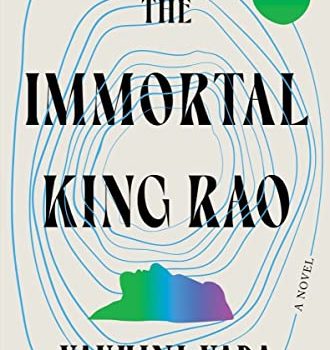Ian Mond Reviews The Immortal King Rao by Vauhini Vara
 The Immortal King Rao, Vauhini Vara (Norton 978-0-393-54175-5, $27.95, 384pp, hc) May 2022.
The Immortal King Rao, Vauhini Vara (Norton 978-0-393-54175-5, $27.95, 384pp, hc) May 2022.
Along with Adam Roberts’ The This and Jennifer Egan’s The Candy House, Vauhini Vara’s debut novel, The Immortal King Rao, is the third book I’ve read this year that imagines a future where people have direct neural access to social media and the internet. This growing literary trend, a mix of cyberpunk and transhumanism, isn’t entirely surprising. It makes sense that authors, already suspicious of the motives of Mark Zuckerberg and Elon Musk and their significant investments in the metaverse and neurotechnology, would start to question the benefits of such uninhibited progress, whether it be concerns about privacy, the loss of individuality or, as Vara frames it, the emergence of a new caste system where an all-seeing, all-knowing algorithm determines social worth.
From her prison cell, Athena Rao, the daughter and only child of King Rao, presents her father’s story to a faceless group of ‘‘Shareholders.’’ She starts with King’s boyhood in India where he is born into a Dalit family, his mother dying during childbirth, and where he spends his formative years in the Garden, a fertile coconut plantation owned by the Rao family. At the age of 22, King, a brilliant software developer, emigrates to America, invited to study at a Seattle University alongside Doctor Norman, the chair of the engineering department. However, it’s Doctor Norman’s daughter, Margaret, the first person King meets in a classic ‘‘meet-cute,’’ who has a profound effect on his life. She inspires King to develop his own software language, and together they take their nascent technology company, Coconut, from a backyard operation selling computers to hobbyists to become the most powerful multinational in the world. King’s eventual fall from grace is precipitated by the death of sixty-four volunteers who were testing the Harmonica, a product that ‘‘in layman’s terms [can] connect your mind to the Internet.’’ Forced to resign from Coconut, King heads to Blake Island near Puget Sound, where he raises his newborn daughter Athena. For the first seven years of her life, Athena only knows the isolation and peace of the island, that is until one morning she wakes up to discover she can access the internet by thought alone.
Structured around the conceit that Athena has intimate access to her father’s memories through her link to the internet, Vara toggles the narrative between King’s early years in India, the founding and global success of Coconut, and King’s self-exile on Blake Island. Vara’s evocative depiction of the Garden, with its squabbling cousins, political unrest, and four-year-old King learning the family business from his Grandfather and then Uncle, is skilfully rendered. But it’s the chapters chronicling King’s life in America, his relationship with Margaret and their ‘‘by your bootstraps’’ inception of Coconut, that I found the most appealing. It reminded me of one of my favourite TV shows of the last decade, Halt and Catch Fire, which, if you haven’t seen it (and why haven’t you?), is a fictionalised account of the personal computer revolution of the 1980s. Both Halt and Catch Fire and The Immortal King Rao capture the genius, the ambition, and the almost prophetic foresight required to bring about a seismic paradigm-shift in technology. Both narratives also recognise and foreground the role of women in the development of the computer and the information highway. Margaret may not have the coding chops of Cameron Howe or the engineering nous of Donna Clark, but without her vision and sense of purpose, Coconut never escapes the confines of Doctor Norman’s backyard shed. Where the two narratives differ is that, in imagining an alternate history where IBM, Apple, and Microsoft never existed, Vara situates an immigrant and person of colour at the centre of a technological revolution that in our world was dominated by young white men.
But, as Athena makes clear, the future Margaret and King usher in is no utopia. The ubiquity of their hardware and software leads to a situation where governments across the world, no longer able to deal with the fallout of climate change (referred to throughout the novel as ‘‘Hothouse Earth’’), hand over the keys to a consortium of companies led by Coconut. On the surface, the ‘‘Shareholder Government’’ that emerges from this new arrangement, ‘‘under which the world’s citizen collectively owned its corporations,’’ is designed to provide each person the opportunity to ‘‘build a life of happiness and success.’’ But with an algorithm determining the social worth of everyone, many fall through the cracks, becoming ‘‘Exes’’ driven to relocate to far-flung islands where Coconut has no sway. Vara’s message is clear, if not entirely subtle. As we relinquish more of our autonomy to the romantic visions of a Mark Zuckerberg or an Elon Musk, we risk creating a society not too dissimilar to the caste system that King was born into.
While I found Athena and the Exes’ rebellion against the Shareholder Government less engaging and a little underbaked, overall The Immortal King Rao is both a strong debut and an important addition to a growing canon of novels addressing our rising anxiety and concerns about where the Digital Age is taking us.
Ian Mond loves to talk about books. For eight years he co-hosted a book podcast, The Writer and the Critic, with Kirstyn McDermott. Recently he has revived his blog, The Hysterical Hamster, and is again posting mostly vulgar reviews on an eclectic range of literary and genre novels. You can also follow Ian on Twitter (@Mondyboy) or contact him at mondyboy74@gmail.com.
This review and more like it in the May 2022 issue of Locus.
 While you are here, please take a moment to support Locus with a one-time or recurring donation. We rely on reader donations to keep the magazine and site going, and would like to keep the site paywall free, but WE NEED YOUR FINANCIAL SUPPORT to continue quality coverage of the science fiction and fantasy field.
While you are here, please take a moment to support Locus with a one-time or recurring donation. We rely on reader donations to keep the magazine and site going, and would like to keep the site paywall free, but WE NEED YOUR FINANCIAL SUPPORT to continue quality coverage of the science fiction and fantasy field.
©Locus Magazine. Copyrighted material may not be republished without permission of LSFF.








